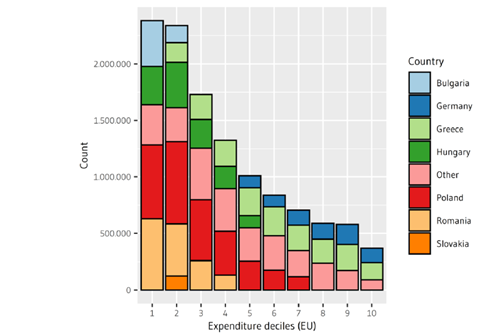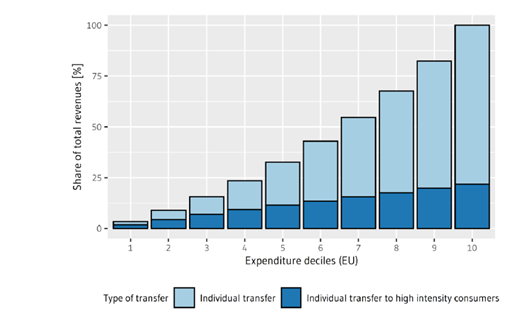The following article is authored by Michael Jakob.
- Rising energy prices in the EU, e.g. due to carbon pricing, raise concerns related to energy poverty.
- Capping fossil fuel prices hurts the climate and is socially unbalanced, as richer people derive higher benefits.
- Recycling carbon pricing revenues back to all citizens yields benefits for low-income households that exceed higher energy costs.
- Targeted financial support for low-income households with high energy consumption and measures to facilitate uptake of low-carbon options are most efficient.
Rising energy prices put substantial pressure on consumers, especially on those with low incomes. Skyrocketing prices of natural gas and oil in the last months have raised concerns that some people might not be able to meet their heating and mobility needs any longer. This kind of vulnerability to rising energy costs is often labelled ‘energy poverty’. It is commonly understood as a combination of low income and high spending on energy, which results in high vulnerability to rising energy prices (Berry 2018).
Energy poverty concerns are not just a temporary issue related to the war in Ukraine. Rather, measures to achieve ambitious climate targets, such as pricing greenhouse gas emissions, can also be expected to raise energy prices in the long term. The proposal by the European Commission to introduce a new Emission Trading Scheme (commonly dubbed ‘ETS2’) for heating and transport fuels is an example of such a policy. A carbon price of € 50 / tCO2, which is regarded to be at the lower end of plausible prices for tradable emission permits in the ETS2, would, for instance, raise prices of gasoline and Diesel by 10 ct/l and 12 ct/l, respectively.
A recent study conducted by the German energy transition project Ariadne, assessed how such a carbon price would affect consumers in the EU (Goerlach et al. 2022). The overall finding is that a carbon price of € 50 / tCO2 would on average have approximate moderate costs slightly above 0.5% of available household income. This policy would have somewhat regressive effects on the income distribution, i.e., it would - relative to their income - affect poorer households more than richer ones.
The study also looks at the effects of returning some of the carbon pricing revenues – which accrue to EU Member States’ budgets through the auction of emission permits – back to citizens. We assess the hypothetical case in which carbon pricing revenues are returned in ways that benefit everyone equally, for instance by an equal-per-capita dividend, tax reductions or investments in public infrastructure. We find that, unsurprisingly, the more carbon pricing revenues are recycled to citizens, the more progressive the scheme becomes. If half of the revenues are recycled, the poorest 20% of the EU population would even turn into net beneficiaries; that is, they would receive transfers exceeding the additional spending needed to cover higher energy prices.
The analysis above only considers averages. Some people that spend an above average share of their income on energy might still be worse off even with compensation measures in place. For this reason, we identify ‘high-intensity consumers’ that spend a comparatively large share of their income on heating and transport fuels.
Figure 1 shows the number of high-intensity consumers in each EU Member State by income group. We find that not all high-intensity consumers are poor. For instance, in Germany and Greece many high-income households spend large fractions of their income on heating and transport fuels. Nevertheless, as energy is a necessity, its expenditure share decreases with higher incomes. The brunt of high-intensity consumers of energy is hence in the lowest income groups, more than five million in the lowest two income deciles, and an additional 1.7 million in the third decile. These people are predominantly located in Eastern EU Member States, such as Bulgaria, Hungary, Poland and Romania.

To ensure that climate policies are socially equitable, governments need to find ways to shield consumers from energy poverty. As a response to higher energy prices, governments resort to a variety of measures (Sgaravatti et al. 2022). Interfering with energy prices (for instance by lowering fuel taxes or value-added taxes) can decrease the financial burden for poor households. However, this approach also stymies the desired effect of incentivizing lower fuel consumption. Moreover, such measures impose high costs on public budgets and over-proportionally benefit high-income consumers, who, in absolute terms consume more fuels than poorer ones.
Financial support does not dilute price signals and thus constitutes a more effective approach to shield vulnerable consumers against energy poverty. Recipients can use this financial assistance to cover their higher energy costs, but they can also adapt their behaviour to save energy and money.
The crucial question for policy makers is how to best employ available funds. As shown in Figure 2, less than 10% of auction revenues in the EU ETS2 would be sufficient to compensate all high-intensity consumers in the lowest four income deciles in the EU. But it might be challenging to identify these vulnerable groups and provide targeted transfers. If policymakers instead provide compensation to all low-income households regardless of their spending on energy, more than 20% would be needed to compensate the lowest four deciles for their higher energy costs.
Some of the funds from auctioning emission permits will also be required to finance the energy transition. Policy makers therefore need to navigate the trade-off between providing effective protection against energy poverty with the lowest possible use of auction revenues. Measures such as expanding and improving public transport or providing financial support for building insulation and heat pump installation could be well-suited to promote the energy transition in a way that increases consumers’ ability to respond to higher energy prices, thus reducing risks of energy poverty. Designing appropriate policies requires a closer understanding of how financial, informational and behavioural key barriers for the adoption of low-carbon options affect different social groups and how these barriers can best be overcome. This could also help prepare the ground for a broader debate on energy poverty, which does not ask how people can still afford using fossil fuels, but how they can thrive in a net-zero world.

Have you seen?
Wanted: a low-carbon and fair reset
Workdays for future? How labour market policies can promote a climate-friendly world of employment
Sustainable welfare: would a mix of universal basic income and universal basic services help?
Recalibrate - our policies were too heavy on efficiency, too light on equity
References
Berry, A., 2018. Measuring energy poverty: uncovering the multiple dimensions of energy poverty. CIRED Working Paper. https://hal.archives-ouvertes.fr/hal-01896838/document.
Goerlach, B., Jakob, M., Umpfenbach, K., Kosch, M., Pahle, M., Konc, T. aus dem Moore, N., Brehm, J., Feindt, S., Pause, F., Nysten, J., Abrell, J., 2022. A Fair and Solidarity-based EU Emissions Trading System für Buildings and Road Transport. Ariadne Report. https://ariadneprojekt.de/media/2022/06/Ariadne-Report_ETS2-SCF_June2022.pdf.
Sgaravatti, G., Tagliapietra, S., Zachmann, G., 2022. National policies to shield consumers from rising energy prices. Bruegel. https://www.bruegel.org/dataset/national-policies-shield-consumers-rising-energy-prices.
….
Michael Jakob is a senior fellow at the Ecologic Institute in Berlin, and a research fellow at the Mercator Research Institute on Global Commons and Climate Change (MCC). His research investigates climate change mitigation in developing countries, the political economy of climate policy, and the interlinkages between environmental policy and human well-being.
The facts, ideas and opinions expressed in this piece are those of the authors; they are not necessarily those of UNESCO or any of its partners and stakeholders and do not commit nor imply any responsibility thereof. The designations employed and the presentation of material throughout this piece do not imply the expression of any opinion whatsoever on the part of UNESCO concerning the legal status of any country, territory, city or area or of its authorities, or concerning the delimitation of its frontiers or boundaries.
